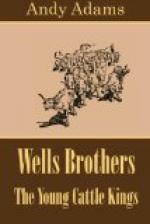The same foreman as the year before was in charge of the herd. He protested against any step tending to delivery for that day, even to looking the cattle over. “Uncle Dud wouldn’t come,” said he, “and it’s up to me to make the delivery. I’ve been pioneering around all summer with this herd, and now that I’m my own boss, I’ll take orders from no one. We made rather a forced drive from the Republican, and I want a good night’s rest for both the herd and myself. Ten o’clock in the morning will be early enough to tender the cattle for delivery. In the mean time, our pilot, the red-headed clerk, will answer all questions. As for myself, I’m going to sleep in the new tent, and if any one calls or wakes me in the morning, I’ll get up and wear him out. I’ve lost a right smart of sleep this summer, and I won’t stand no trifling.”
Joel fully understood that the object in delay was to have the herd in presentable condition, and offered no objection. The beeves were grazed up opposite headquarters, and the guards were arranged for the night, which passed without incident. Thereafter, as a matter of precaution, a dead-line must be maintained between the wintered and the through cattle; and as Manly was to remain another year, he and an assistant were detailed to stay at headquarters. A reduced mount of horses was allowed them, and starting the beeves at daybreak, the wagon and remuda followed several hours later.
The trail foreman was humored in his wishes. It was nearly noon when the through herd was reached, grazed and watered to surfeiting, and a single glance satisfied Joel Wells that the cattle fully met every requirement. The question of age was disposed of as easily as that of quality.
“We gathered this year’s drive on our home ranges,” said the foreman, “and each age was held separate until the herds were made up. I started with fifteen hundred threes and sixteen hundred twos, with ten head extra of each age, in case of loss on the trail. Our count on leaving Ogalalla showed a loss of twelve head. I’m willing to class or count them as they run. Manly knows the make-up of the herd.”
Sargent and the brothers rode back and forth through the scattered cattle. It meant a big saving of time to accept them on a straight count, and on being rejoined by the foreman, Joel waived his intent to classify the cattle.
“I bought this herd on Mr. Stoddard’s word,” said he, “and I’m going to class it on yours. String out your cattle, and you and Manly count against Sargent and myself.”
A correct count on a large herd is no easy task. In trailing formation, the cattle march between a line of horsemen, but in the open the difficulty is augmented. A noonday sun lent its assistance in quieting the herd, which was shaped into an immense oval, and the count attempted. The four men elected to make the count cut off a number of the leaders, and counting them, sent them adrift. Thereafter, the trail outfit fed the cattle between the quartette, who sat their horses in speechless intensity, as the column filed through at random. Each man used a string, containing ten knots, checking the hundreds by slipping the knots, and when the last hoof had passed in review, the quiet of a long hour was relieved by a general shout, when the trail outfit dashed up to know the result.




